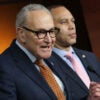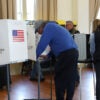If you did not know that you were supposed to affix a federally mandated sticker to your otherwise lawful UPS package, should you be arrested face down on the pavement by FBI agents training automatic weapons at you? Our hunch is that most reasonable Americans would respond with an emphatic ‘No!’ Today we are launching a series of posts based on case studies adapted from our new book, One Nation Under Arrest: How Crazy Laws, Rogue Prosecutors, and Activist Judges Threaten Your Liberty. The book includes stories of average Americans who have been arrested, prosecuted, convicted – and even imprisoned – despite the fact that they were doing their best to be respectable, law-abiding citizens. The UPS-sticker example is just one real world example we will be highlighting.
Heritage fellow Jack Park kicks off the series today. He relates how George Norris, a 67-year-old husband and grandfather, ended up spending almost two years in federal prison. Some of Norris’s paperwork for his home-based orchid business did not meet all of the technical requirements of an international treaty. None of his orchids were illegal to import, possess, or sell, but that did not stop the government from prosecuting and imprisoning him.
One Nation Under Arrest analyzes the causes of overcriminalization and offers solid proposals for reforming the law. To be solved, the problems of overcriminalization must be fully recognized and understood. Overcriminalization includes applying criminal penalties to activities that are socially and economically beneficial. Consider, for example, the obscure environmental laws that dictate what you can and cannot do in your own home even when they may not provide any clear environmental benefit.
Overcriminalization also includes creating offenses that are so vague and broad that they grant federal prosecutors a license to deem broad swaths of conduct “criminal.” The federal “honest services” fraud statute, for example, is so vague and far-reaching that even conservative Supreme Court Justice Antonin Scalia has written that prosecutors could use it to convict and imprison Americans who call in “sick” to attend a ballgame.
Increasingly over the past few decades, the U.S. Congress has been callously disregarding the limits the Constitution places on the federal government’s authority to criminalize otherwise innocent conduct and engaging in similarly improper criminalization. This has partially succeeded in warping Americans’ collective understanding of what should – and what should not – be the subject of federal criminal punishment.
But most Americans still have not surrendered their sound judgment that criminal punishment should be carefully limited. If you buy or sell personal shares of stock and are unaware that you are technically violating some obscure trading rule on corporate mergers and acquisitions that are conducted via tender offer (whatever that is), should you have to face the possibility of paying for your lack of knowledge by spending time in federal prison with murderers, child rapists, and drug traffickers? Anyone who has traded stock yet is not intimately familiar with the hundreds or thousands of relevant statutes, rules, and regulations would again probably say ‘No!’
Congress and state legislatures increasingly view the criminal law as the tool of choice to “solve” every problem, punish every mistake (instead of making appropriate use of civil penalties), and coerce Americans into conforming their behavior to satisfy social engineering objectives. Criminal law should be used to redress only that conduct which Americans rightly and reasonably determine is deserving of society’s greatest punishment and moral sanction. As had been the rule for centuries, no one should be punished as a criminal unless he committed a wrongful act knowing that it was illegal or wrongful – that is, unless he acted with criminal intent.
Like the stories in this Foundry series, One Nation Under Arrest highlights how criminal law and punishment today frequently transgress these boundaries and harm the innocent. If you want to know more about how overcriminalization endangers you and other honest, respectable Americans, keep checking in on this Foundry series and click below to order a copy of One Nation Under Arrest.
































15 Replies to “One Nation Under Arrest”